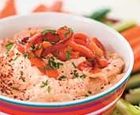|
Turkish Appetizer Roasted Red Pepper Dip Sweet and savory, this lovely pink dip adds hot pepper flakes for a surprising little kick.
In a food processor, pulse the walnuts and breadcrumbs a few times, till you get a coarsely-grained texture (not a fine powder). Add the roasted peppers, garlic, pepper flakes, cumin and lemon juice and close the lid. While pulsing, gradually pour the olive oil in from the opening at the top. Don’t over blend, as you still want a grainy texture to the dip. Serve with pita bread (toasted or untoasted) or raw vegetables. |
Tips & Glossary You may not have all the ingredients used in Turkish cooking on your spice shelf, but you'll find them at Middle-East food stores. To avoid frustration, make a list of items you need before trying out the recipes. Cumin: an aromatic, kin to parsley and carrots; an important ingredient in chili powder. Used especially in Indian curries, as well as in Mid-Eastern, Mexican, and Asian dishes. It has an earthy, peppery flavor. Filo: aka phyllo, paper-thin sheets of raw, unleavened flour dough. Buy frozen in any grocery store and follow directions on package for thawing. When working with one sheet, keep others covered with a damp towel to prevent drying out. Peeled Tomatoes: choose 1 of 2 methods: 1) hold tomatoes one-at-a-time over gas flame till skin bubbles and becomes charred; 2) drop all tomatoes into pot of boiling water for 45 seconds. After either method, run tomatoes under running water; skins will slip off easily. Roasted peppers: buy them prepared. Or make your own: place peppers under a broiler, or hold over a gas flame, till skin chars and blisters. Place them in a closed paper bag for 15-20 minutes (to steam them). When cool enough to handle, the skins slip off under running water. Rosewater: distilled from rose petals and used to flavor Mid-Eastern and Asian cooking. You can make your own—but why? Purchase it at Mid-East or Asian or food stores. Saffron: the most expensive spice in the world, from the crocus plant, and cultivated in Iran and Spain. Along with its unusual taste, it adds a deep rich yellow color to food. Use a strand or two at a time and soak in warm water before using. Skewers: use metal or wooden skewers for kabobs. If wooden, be sure to soak them for 30 minutes before using to prevent them from catching on fire.
|
Site by BOOM
![]()
LitLovers © 2024

